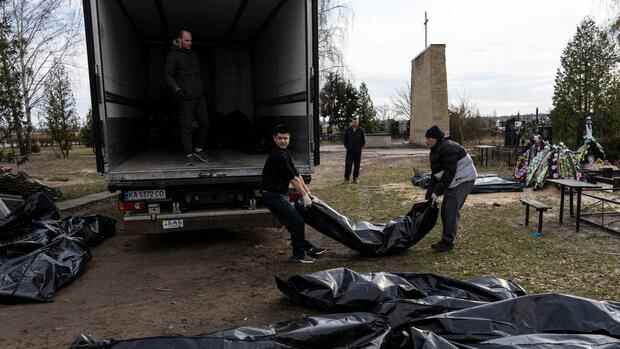The Ukrainian authorities accuse the Russian army of numerous war crimes in the country.
(Photo: dpa)
Dusseldorf After discovering atrocities in Ukraine, NATO tightened its course on Russia. At a meeting of NATO foreign ministers in Brussels on Thursday, a radical change of course on the question of the delivery of heavy weapons to Ukraine became clear. The NATO countries officially agreed on Thursday to provide additional military aid to Ukraine. Ukrainian President Volodymyr Zelenskiy had previously called for more support from the West in view of an expected Russian offensive in eastern Ukraine.
About two weeks ago, a delivery of heavy weapons in the defense alliance was ruled out because of concerns that Russia could also take action against NATO countries. Several participants now confirmed in the background that the NATO country Czech Republic has already brought main battle tanks to Ukraine.
Foreign Minister Annalena Baerbock (Greens) said that the partners are looking at how Ukraine can be supported more intensively and in a coordinated manner in the future. Ukraine has a right to self-defense.
NATO Secretary General Jens Stoltenberg made a similar statement. British Foreign Minister Liz Truss said: “We are intensifying our arms deliveries to Ukraine.” There were initially no details on the planned new arms deliveries from NATO countries.
Top jobs of the day
Find the best jobs now and
be notified by email.
In view of the expected Russian offensive in eastern Ukraine, Ukrainian Foreign Minister Dmitro Kuleba urged speed. “Either you help us now, and I’m talking in days not weeks, or your help will be too late.”
The Ukrainian foreign minister is urging NATO to speed up arms deliveries.
(Photo: AP)
Authorities: 9 out of 10 civilians killed in Bucha have gunshot wounds
According to the local authorities, the evidence of Russian war crimes is increasing in the Kiev suburb of Bucha. About 90 percent of the civilians killed had gunshot wounds, Mayor Anatoly Fedoruk told DW on Thursday. As of Wednesday evening, 320 bodies had been found in Butscha. “But the number of bodies discovered is increasing every day,” Fedoruk said.
The Federal Intelligence Service (BND) has intercepted radio messages from the Russian military proving atrocities committed against the Ukrainian civilian population not far from Kyiv. As the “Spiegel” first reported on Thursday, the foreign secret service informed parliamentarians on Wednesday about the content of the radio messages. According to information from the German Press Agency, these show that paramilitary units were deployed outside of Kyiv in March on behalf of the Russian army.
>> The current developments in the Ukraine war you can follow in our news blog
The human rights organization Amnesty International reported on Thursday about new indications of Russian war crimes in Ukraine, citing Ukrainian eyewitnesses. According to their information, Russian troops have repeatedly shot unarmed people in their homes or on the street, the organization said on Thursday.
In one case, a woman was raped multiple times after her husband was killed. According to the information, an Amnesty team spoke to more than 20 people from places near the Ukrainian capital Kyiv in the past few weeks who had witnessed Russian violence or had direct knowledge of the violence.
The alliance wants to deliver significantly more weapons to Ukraine.
(Photo: dpa)
Russia: Ukraine sabotages peace talks
Russia’s Foreign Minister Sergey Lavrov accused Ukraine of sabotaging the peace talks. Ukraine is moving away from regulations. At a previous meeting, Ukraine committed to a non-aligned, neutral status and pledged to conduct international military exercises on its territory only with the consent of all future guarantor powers, including Russia, Lavrov said Thursday, according to the Interfax agency.
In the new version of the agreement, on the other hand, Kyiv only speaks of the “majority of guarantor powers” and Russia is no longer mentioned, the Russian chief diplomat complained.
Other recent reports on the war:
Russia invaded Ukraine on February 24 – exactly six weeks ago. Four days after the invasion, negotiations to end hostilities began. After the round of negotiations in Istanbul, Moscow announced that it would withdraw its troops from Kyiv and concentrate on fighting in eastern Ukraine.
Ahead of the expected Russian offensive, Ukrainian President Zelensky called for more support from the West. If there is no “really painful package of sanctions” and no delivery of the weapons demanded by Kyiv, Russia will see this as “permission to advance,” he warned.
The federal and state governments are discussing the costs of refugees
On Thursday, Chancellor Olaf Scholz (SPD) began consultations with the prime ministers on the costs of caring for Ukrainian war refugees. The federal-state meeting also deals with the registration and distribution of the incoming Ukrainians to the states and municipalities.
On Thursday, the EU discussed a fifth package of sanctions, which should also include an import ban on Russian coal. The EU is also supporting those states that take in refugees from Ukraine with a further 3.4 billion euros. The EU Parliament approved a corresponding proposal by the EU Commission on Thursday in Strasbourg.
Around 2.55 million refugees from Ukraine have fled to safety in neighboring Poland alone since the Russian invasion began more than a month ago. 23,400 people were dispatched on Wednesday. This is an increase of 16 percent compared to the day before, as the Polish border guard announced on Twitter on Thursday.
More than 2.5 million Ukrainians have now fled to the neighboring country.
(Photo: dpa)
More: Dispute over refugee costs: “The prime ministers are at 180”
